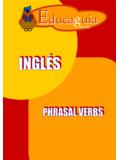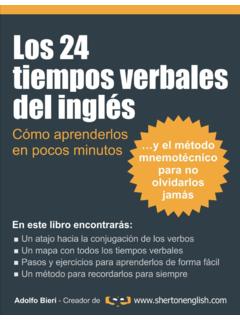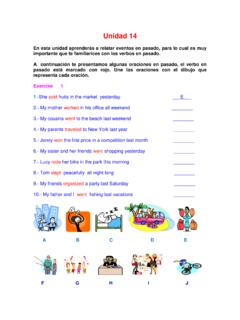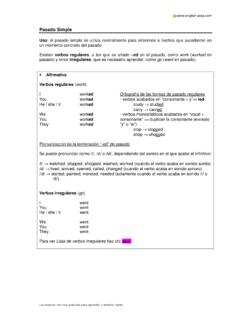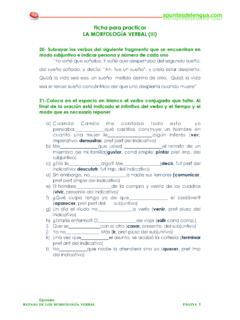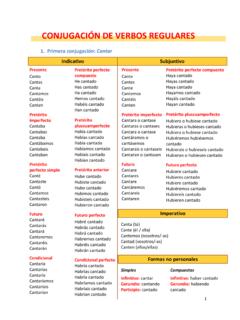Transcription of EL VERBO - Educaguia
1 EL VERBO 1 1. VERBO TO BE (Ser, estar) PRESENTE AFIRMATIVO PRESENTE NEGATIVO: (Soy, estoy): I am (I'm) I am not (I'm not) You are (you're) You are not (aren't) He is (he's) He is not (isn't) She is (she's) She is not (isn't) It is (it's) It is not (isn't) We are (we're) We are not (aren't) You are (you're)
2 You are not (aren't) They are (they're) They are not (aren't) PRESENTE INTERROGATIVO: Am I? Are you? Is he? Is she? Is it? Are we? Are you? Are they? Rita M Jim nez Carvajal 1EL VERBO Rita M Jim nez Carvajal PASADO AFIRMATIVO PASADO NEGATIVO: (Era, estaba, fui, estuve): I was I was not (wasn't) You were You were not (weren't) He was He was not (wasn't) She was She was not (wasn't) It was It was not (wasn't) We were We were not (weren't)
3 You were You were not (weren't) They were They were not (weren't) PASADO INTERROGATIVO: Was I? Were you? Was he? Was she? Was it? Were we? Were you? Were they? FORMAS IMPERSONALES DEL VERBO TO BE: There is: hay (nombre en singular) There isn't: no hay (nombre en singular) There are: hay (nombre en plural) There aren't: no hay (nombre en plural) There was: hab a (nombre en singular) There wasn't: no hab a (nombre en singular) There were: hab a (nombre en plural) There weren't: no hab a (nombre en plural) There will be: habr There will not (won't) be: no habr There would be: habr a There would not (wouldn't) be: no habr a Is there? Are there? Was there? Were there? Will there be Would there be? EL VERBO Rita M Jim nez Carvajal 3 Las formas en singular se utilizan antes de un nombre incontable o ante un contable en singular, mientras que las formas en plural se utilizan para nombres contables en plural.
4 Nota: los dem s tiempos simples de este VERBO (futuro y condicional) y los tiempos compuestos siguen el sistema normal que aparece en los dem s verbos ingleses. Adem s del significado "ser, estar" este VERBO puede aparecer con otras significaciones, concretamente se utiliza cuando hablamos de: a).- Edad: How old are you? I'm eighteen. b).- Temperatura: It's hot today. c).- Altura: How tall is she? She is 1 metre 68. d).- Peso: How heavy are you? I am 52 kilos. e).- Tama o: My flat is a hundred square metres. f).- Distancia: It is 100 kilometres to London. g).- Precio: How much is it? It is h).- Hora: What time is it? It is half past two. i).- Fecha: It is 21st May today. j).- Hambre - sed: Are you hungry? No, I'm not, but I'm thirsty. EL VERBO 2 2. VERBO TO HAVE (Tener, haber) Al lado del VERBO To Have en ingl s la posesi n puede indicarse con el VERBO To Have Got; la diferencia de significado entre ambos no existe, pero s hay diferencias en su formaci n, porque: - Este VERBO sigue la formaci n normal de los dem s verbos ingleses, es decir, deja de considerarse como un VERBO especial, y puede aparecer con auxiliares.
5 - Este VERBO no se utiliza ni en pasado ni en futuro. Este VERBO se utiliza como auxiliar en la formaci n de los tiempos compuestos, con lo cual equivale a nuestro castellano haber . PRESENTE AFIRMATIVO PRESENTE NEGATIVO: (tengo): I have I have not (haven't) You have You have not (haven't) He has He has not (hasn't) She has She has not (hasn't) It has It has not (hasn't) We have We have not (haven't) You have You have not (haven't)
6 They have They have not (haven't) Rita M Jim nez Carvajal 4EL VERBO Rita M Jim nez Carvajal PRESENTE INTERROGATIVO: Have I? Have you? Has he? Has she? Has it? Have we? Have you? Have they? PASADO AFIRMATIVO PASADO NEGATIVO: (ten a, tuve): I had I had not (hadn't) You had You had not (hadn't) He had He had not (hadn't) She had She had not (hadn't) It had It had not (hadn't) We had We had not (hadn't) You had You had not (hadn't)
7 They had They had not (hadn't) PASADO INTERROGATIVO: Had I? Had you? Had he? Had she? Had it? Had we? Had you? Had they? Nota: los dem s tiempos simples (futuro y condicional) y los tiempos compuestos siguen el sistema normal de los dem s verbos ingleses. Este VERBO , igual que el To Be, adem s del significado b sico, puede aparecer con otras significaciones, concretamente: EL VERBO Rita M Jim nez Carvajal 6 a).- Puede equivaler a eat (comer), drink (beber) o smoke (fumar): She's having a cup of tea. b).- Puede equivaler a get (obtener) o receive (recibir): I had a phone call fro her yesterday. EL VERBO 3 3. VERBO CAN (Poder) PRESENTE AFIRMATIVO PRESENTE NEGATIVO: (puedo): I can I cannot You can You cannot (can't) He can He cannot (can't) She can She cannot (can't) It can It cannot (can't) We can We cannot (can't) You can You cannot (can't)
8 They can They cannot (can't) PRESENTE INTERROGATIVO: Can I? Can you? Can he? Can she? Can it? Can we? Can you? Can they? Rita M Jim nez Carvajal 7EL VERBO Rita M Jim nez Carvajal PASADO AFIRMATIVO PASADO NEGATIVO: (pod a, pude): I could I could not (couldn't) You could You could not (couldn't) He could He could not (couldn't) She could She could not (couldn't) It could It could not (couldn't) We could We could not (couldn't)
9 You could You could not (couldn't) They could They could not (couldn't) PASADO INTERROGATIVO: Could I? Could you? Could he? Could she? Could it? Could we? Could you? Could they? Desde un punto de vista sint ctico se caracteriza por que cuando va seguido de un VERBO en infinitivo, ste pierde siempre la part cula "to". Es un VERBO defectivo, con lo cual para expresar contenidos en otros tiempos verbales se utiliza el giro To Be Able . EL VERBO 4 4 4. VERBO MUST (Deber) PRESENTE AFIRMATIVO PRESENTE NEGATIVO: (debo): I must I must not (mustn't) You must You must not (mustn't) He must He must not (mustn't) She must She must not (mustn't) It must It must not (mustn't) We must We must not (mustn't)
10 You must You must not (mustn't) They must They must not (mustn't) PRESENTE INTERROGATIVO: Must I? Must you? Must he? Must she? Must it? Must we? Must you? Must they? Nota: tanto el pasado como las formas compuestas se suplen con la expresi n "to have to". Desde un punto de vista sint ctico se caracteriza por que cuando va seguido de un VERBO en infinitivo, ste pierde siempre la part cula "to". Rita M Jim nez Carvajal 9EL VERBO 5 5. FORMACI N DE TIEMPOS VERBALES PRESENTE SIMPLE - PRESENT SIMPLE (yo amo, t amas, l ama): Afirmativa: tanto en los verbos regulares como en los irregulares se forma con el infinitivo sin "to", y en la tercera persona del singular se a ade una -s (-es cuando acaba el VERBO en /s, ss, sh, ch, x, o/, e -ies cuando el VERBO acaba en un grupo de consonante m s /y/).


